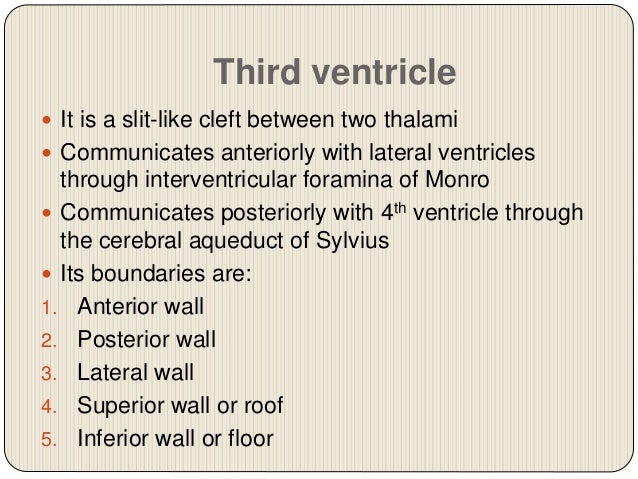The main function of the fourth ventricle is to provide cushioning for the brain by containing cerebrospinal fluid.
Floor of 4th ventricle function.
The fourth ventricle has an anterior ventral floor with a characteristic diamond shape named the rhomboid fossa and a posterior dorsal tent shaped roof.
The floor of the fourth ventricle the rhomboid fossa see fig.
In this article we shall look at the functions and production of cerebrospinal fluid and the anatomy of the ventricles that contains it.
It is situated in the grey matter lining the floor of the fourth ventricle near the midline.
The third ventricle is a narrow cavity located between the two hemispheres of the diencephalon of the forebrain the third ventricle is part of a network of linked cavities cerebral ventricles in the brain that extend to form the central canal of the spinal cord the cerebral ventricles consist of the lateral ventricles third ventricle and fourth ventricle.
The only naturally occurring openings between the ventricles of the brain and the subarachnoid space surrounding the brain are the foramina of luschka and magendie in the fourth ventricle.
The obex is also a.
The fourth ventricle contains cerebrospinal fluid.
These structures are responsible for the production transport and removal of cerebrospinal fluid which bathes the central nervous system.
The ventricular system is a set of communicating cavities within the brain.
Specifically it spans from the obex an area in the medulla.
Hydrocephalus is classified as noncommunicating and communicating based on whether all ventricular and subarachnoid spaces are communicating.
Both the funiculus separans and area postrema have a similar thick ependyma containing tanycyte.
The area postrema is situated just before the obex the inferior apex of the caudal ventricular floor.
10 3 is formed by the pons and medulla fig.
Csf produced and or flowing into the fourth ventricle can exit to the subarachnoid space through lateral apertures and a single median aperture located in the inferiorportion of the roof.
The abducent nucleus is a motor nucleus and sends its attached nerve to supply the lateral rectus muscle.
The fourth ventricle has a roof at its upper posterior surface and a floor at its lower anterior surface and side walls formed by the cerebellar peduncles nerve bundles joining the structure on the posterior side of the ventricle to the structures on the anterior side.
The vagal trigone overlies the dorsal vagal nucleus and is situated on the caudal end of the rhomboid fossa or floor of the fourth ventricle.
This nucleus lies in the lower part of the pons deep to the facial colliculus in the floor of the fourth ventricle.
The fourth ventricle outlet obstruction fvoo is a rare but well established cause of obstructive tetra ventricular hydrocephalus characterizing with dilatation or large cerebrospinal fluid collection of the foramen of magendie and foramen of luschka.
These are very important functions and trauma to the fourth ventricle can be very dangerous.

